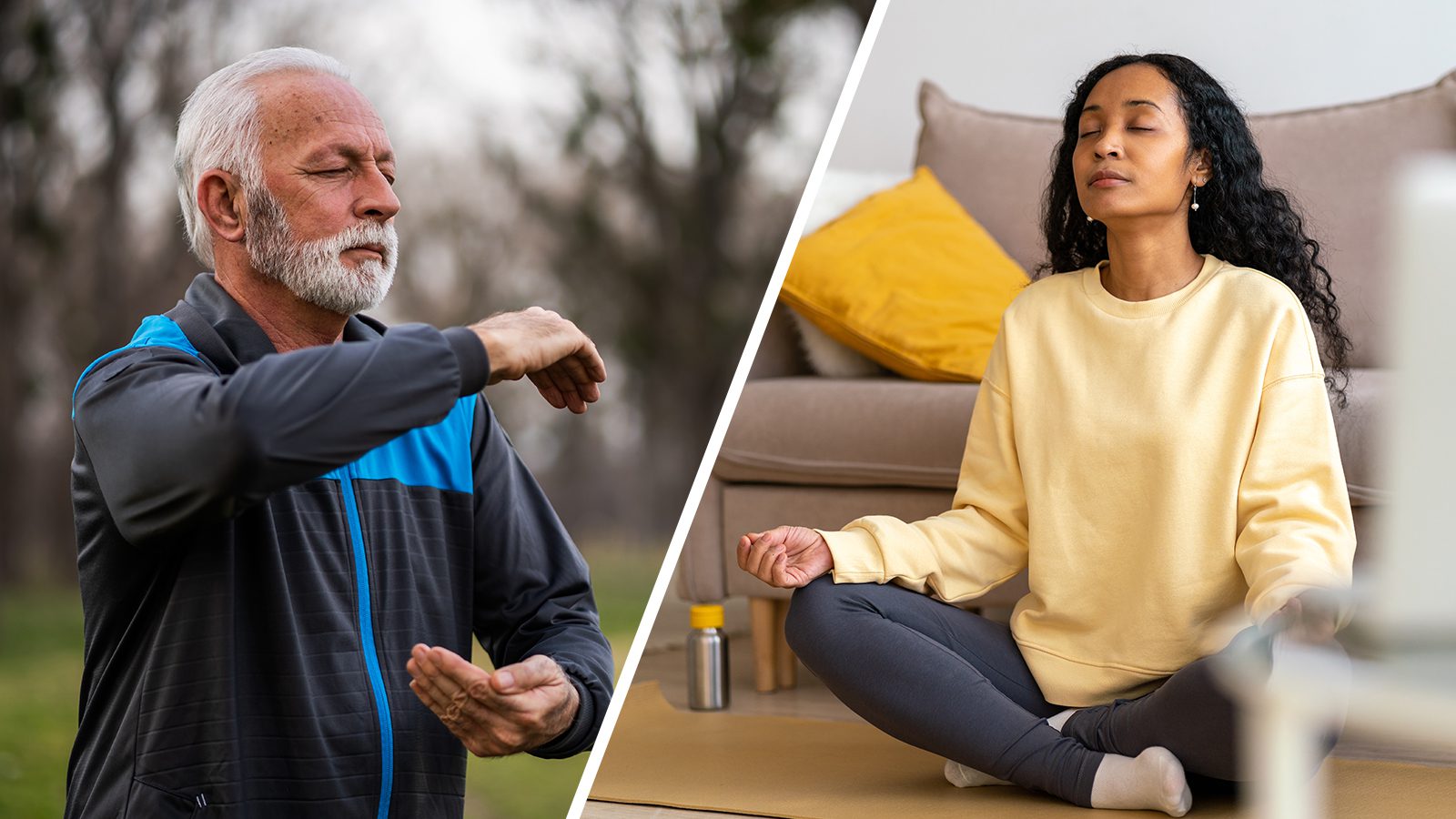Being concerned about your brain health is essential at any age but can be even more critical as you age. Factors like stress, aging, and health conditions can affect your mind. Fortunately, physical exercises that include stretching may benefit your brain more than you realize, and it may be just what you need to keep cognitive decline at bay.
It’s fascinating that many cultures in the ancient world understood the intimate connection between body, mind, and spirit. Ancient practices like yoga and Tai Chi blend stretching, poses, and mindful breathing for total well-being. Thankfully, these stretches can be altered to your abilities so that you can enjoy the benefits without pain.
How Yoga Can Help with Brain Health
Yoga is a practice that goes back thousands of years to Ancient India. Today, medical experts acknowledge its health benefits, such as improving oxygen flow and increasing circulation. Researchers are also discovering that yoga poses and stretches may benefit your brain health.
If you’ve studied the central nervous system, you know that your brain’s gray matter contains all the neurons. It is responsible for learning, memory, senses, self-awareness, and muscle control. When you practice yoga, it may increase your gray matter and expand your mind’s memory centers.
When you’re feeling depressed, anxious, or irritable, it’s often difficult to think clearly. Plus, chronic stress can lead to several severe physical and mental disorders. Numerous studies confirm that yoga can decrease cortisol, relieve stress, and improve moods.
Tai Chi’s Benefits for Better Cognition
Tai Chi is also an ancient practice of movement and breathing. It was developed as a martial art in Ancient China. People of all ages and walks use Tai Chi for fitness, strength, and mental clarity.
You don’t need fancy exercise equipment or a gym membership to practice Tai Chi. All you need is a safe and comfortable space or room at home. Did you know that your brain shrinks as you age? The good news is that practicing Tai Chi may help. Indeed, it might even increase your brain volume and improve your cognition. It also has promising benefits in boosting memory in seniors.
Another brain-boosting trait Tai Chi shares with yoga is its combination of meditations. Adding to the physical elements may help increase your ability to focus. It can train your brain to be more mindful and not rush into decisions.
6 Stretches for Optimal Brain Health
If you are concerned about your mind’s health, try these six stretches taken from the two practices. Having an exercise routine is imperative as you age. Perhaps more surprisingly, these moves may help you avoid declines that come with an aging mind. All you need is a few minutes a day to devote to stretching.
Yoga Poses and Tai Chi Stretches for Brain Health
The beauty of yoga is that it combines stretching, poses, and mindful breathing. Using these three components benefits your brain health and your body and spirit. You can practice yoga exclusively or incorporate it into your daily exercise routine.
Inverted or upside-down yoga poses and stretches are beneficial. They stimulate blood flow to your brain, which nourishes your brain cells. Here are easy yoga stretches to try if you want to boost your brain health.
1. Mountain Pose
Let’s face it: your brain doesn’t function at peak levels when you’re sleep-deprived. This gentle stretch helps you focus on breathing and allows you to relax. If you do it in the evenings, you may sleep better and improve your brain health. Here’s how:
•Stand up straight with your feet on your mat, and your arms outstretched.
•Open your hand with your palms facing forward. Your pelvis should be neutral while your ab muscles are engaged.
•Now, pull your shoulders back and broaden your chest muscles.
•While facing forward, gently stretch your head and neck toward the ceiling.
•Inhale through your nose and exhale slowly through your mouth.
2. Lotus Pose
This is a classic yogic pose that even most people who don’t practice yoga recognize. You’ll feel the tension drain from your muscles and joints. Such relaxation helps rejuvenate your tired body and mind. Here’s how:
•Sit comfortably on your mat with your legs outstretched and your back as straight as possible. Place a small cushion against your back for extra support and comfort.
•Bend your right leg, gently grasp your right foot, and place it on your left thigh.
•Bring your heel as close to your tummy as possible without causing pain.
•Next, bend your left leg, grasp your left foot, and place it onto your right thigh similarly.
•Join each hand’s index finger and thumb into a circle. Or you can cross your hands over your chest or bring them together as in prayer.
•While stretching is important, don’t forget to breathe deeply during this pose.
•You can stay in this position for fifteen to twenty minutes and clear your thoughts. Remember–relaxation is ideal for brain health.
3. Shoulder Stand
This yoga pose stretches your entire body while getting the kinks out of your spine. It’s also an inverted stance that increases blood flow to your brain. You can use a pillow to support your back if it helps. Here’s how:
•Lie comfortably with your back on your mat and your arms at your side.
•Now, raise your legs slowly upward as far as possible without pain.
•Place your hands flat on your lower back.
•Slowly raise your bottom and lower back while using your hands for support, elbows bent against the mat.
•As you mindfully breathe, raise your body until your chin touches your chest or as high as you can without hurting.
•Hold this position for a few breaths, then slowly lower your body back to the starting position.
4. Tai Chi Shoulder Stretching
Like most people, you probably carry a lot of tension. Not only can this stress cause physical pain, but it’s also detrimental to brain health. Try this gentle shoulder stretch to ease the tension. Here’s how:
•First, stand naturally with your legs shoulder-width apart and focus straight ahead.
•Hold your hands out in front of you with your palms facing down toward the mat.
•Now, raise your hands slowly until they parallel your shoulders.
•Turn your wrists until your palms are facing toward you.
•Bring your hands toward your face and gently push your chin back. You’ll feel a little stretch that shouldn’t be painful.
•Extend your palms in front of you.
•In the same fluid motion, lower your arms slowly to your sides while gently bending down your neck.
•Hold for two to three breaths and return to the starting position.
5. Tai Chi Neck Stretch
Do you often have pain in the back of your neck because of stress and overstraining? You may also battle headaches and problems with your concentration. This neck stretch can work to alleviate neck, head, and shoulder aches. Thankfully, you can do this at the office when sitting on the computer for hours is causing you strain. Here’s how:
•Stand neutrally with your back straight and your legs shoulder-length apart.
•Look straight ahead and relax.
•Extend both arms and hands at your sides with your palms facing upward.
•Next, slowly raise your arms toward your head.
•When they are parallel with your shoulders, turn your palms and slowly lower your arms.
•Do this movement as if you were pushing something toward the ground.
•Return to the starting position. Try to do at least 4-5 repetitions.
6. Tai Chi Back Stretch
Perhaps nothing is worse than an achy back due to injury, stress, and strain. Your spine protects your spinal cord, your brain’s primary connection with the rest of your body. Caring for your spine with stretches like this is essential to good physical and brain health. Here’s how:
•Stand comfortably on your mat with your legs shoulder-width apart.
•Hold your hands in front of you as if you were holding a basketball. Your right hand is on top of the ball, while your left hand has the ball from below.
•Stretch your left hand as if lifting the basketball toward the ceiling and hold for a few breaths.
•Gently return to the starting position, switch hands, and repeat these steps.
Final Thoughts on Stretches for Brain Health
Although these yoga and Tai Chi stretches aren’t too tricky, you should stop immediately if you feel pain. Some may have to be modified if you have a medical condition. Talk to a certified fitness instructor before you begin this or any other exercise routine.
You’re never too young to take your brain health seriously. Consider adding these stretches to your daily exercise workout. They can be part of a plan that keeps your entire body healthy and happy for years.
















 Community
Community

